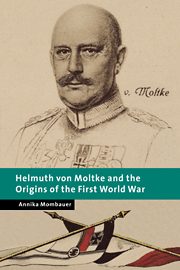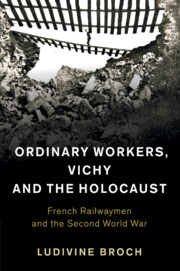Refine search
Actions for selected content:
15418 results in Military history
Contents
-
- Book:
- Ordinary Workers, Vichy and the Holocaust
- Published online:
- 05 June 2016
- Print publication:
- 07 June 2016, pp viii-x
-
- Chapter
- Export citation
Index
-
- Book:
- Ordinary Workers, Vichy and the Holocaust
- Published online:
- 05 June 2016
- Print publication:
- 07 June 2016, pp 263-280
-
- Chapter
- Export citation
7 - Shoah
-
- Book:
- Ordinary Workers, Vichy and the Holocaust
- Published online:
- 05 June 2016
- Print publication:
- 07 June 2016, pp 165-194
-
- Chapter
- Export citation
4 - Theft
-
- Book:
- Ordinary Workers, Vichy and the Holocaust
- Published online:
- 05 June 2016
- Print publication:
- 07 June 2016, pp 96-119
-
- Chapter
- Export citation
Dedication
-
- Book:
- Ordinary Workers, Vichy and the Holocaust
- Published online:
- 05 June 2016
- Print publication:
- 07 June 2016, pp v-vi
-
- Chapter
- Export citation
5 - Protest
-
- Book:
- Ordinary Workers, Vichy and the Holocaust
- Published online:
- 05 June 2016
- Print publication:
- 07 June 2016, pp 120-142
-
- Chapter
- Export citation
Contents
-
- Book:
- Ordinary Workers, Vichy and the Holocaust
- Published online:
- 05 June 2016
- Print publication:
- 07 June 2016, pp xii-xii
-
- Chapter
- Export citation
6 - Sabotage
-
- Book:
- Ordinary Workers, Vichy and the Holocaust
- Published online:
- 05 June 2016
- Print publication:
- 07 June 2016, pp 143-164
-
- Chapter
- Export citation
Glossary
-
- Book:
- Ordinary Workers, Vichy and the Holocaust
- Published online:
- 05 June 2016
- Print publication:
- 07 June 2016, pp 242-243
-
- Chapter
- Export citation
Contents
-
- Book:
- Ordinary Workers, Vichy and the Holocaust
- Published online:
- 05 June 2016
- Print publication:
- 07 June 2016, pp vii-vii
-
- Chapter
- Export citation
Acknowledgements
-
- Book:
- Ordinary Workers, Vichy and the Holocaust
- Published online:
- 05 June 2016
- Print publication:
- 07 June 2016, pp xiii-xv
-
- Chapter
- Export citation
Copyright page
-
- Book:
- Ordinary Workers, Vichy and the Holocaust
- Published online:
- 05 June 2016
- Print publication:
- 07 June 2016, pp iv-iv
-
- Chapter
- Export citation
3 - Bahnofs1
-
- Book:
- Ordinary Workers, Vichy and the Holocaust
- Published online:
- 05 June 2016
- Print publication:
- 07 June 2016, pp 68-95
-
- Chapter
- Export citation
Bibliography
-
- Book:
- Ordinary Workers, Vichy and the Holocaust
- Published online:
- 05 June 2016
- Print publication:
- 07 June 2016, pp 244-262
-
- Chapter
- Export citation
Glossary
-
- Book:
- Ordinary Workers, Vichy and the Holocaust
- Published online:
- 05 June 2016
- Print publication:
- 07 June 2016, pp xvi-xvii
-
- Chapter
- Export citation
8 - Liberation
-
- Book:
- Ordinary Workers, Vichy and the Holocaust
- Published online:
- 05 June 2016
- Print publication:
- 07 June 2016, pp 195-221
-
- Chapter
- Export citation
Contents
-
- Book:
- Ordinary Workers, Vichy and the Holocaust
- Published online:
- 05 June 2016
- Print publication:
- 07 June 2016, pp xi-xi
-
- Chapter
- Export citation

Helmuth von Moltke and the Origins of the First World War
-
- Published online:
- 05 June 2016
- Print publication:
- 19 April 2001

Ordinary Workers, Vichy and the Holocaust
- French Railwaymen and the Second World War
-
- Published online:
- 05 June 2016
- Print publication:
- 07 June 2016
7 - “The Boys of 61”
- from Part II - Battlefield
-
- Book:
- From Hometown to Battlefield in the Civil War Era
- Published online:
- 05 May 2016
- Print publication:
- 17 May 2016, pp 263-296
-
- Chapter
- Export citation
